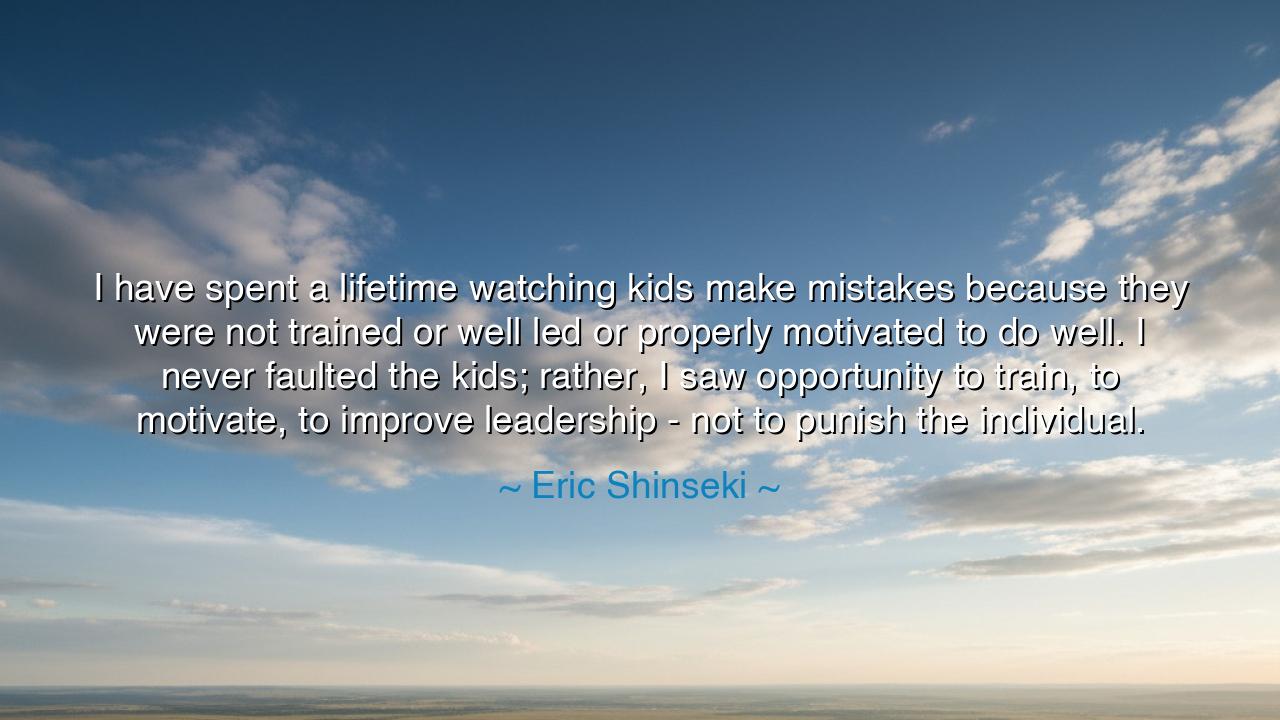
I have spent a lifetime watching kids make mistakes because they
I have spent a lifetime watching kids make mistakes because they were not trained or well led or properly motivated to do well. I never faulted the kids; rather, I saw opportunity to train, to motivate, to improve leadership - not to punish the individual.






The words of Eric Shinseki ring with the gravity of a general and the tenderness of a teacher: “I have spent a lifetime watching kids make mistakes because they were not trained, or well led, or properly motivated to do well. I never faulted the kids; rather, I saw opportunity to train, to motivate, to improve leadership—not to punish the individual.” Here lies the wisdom of one who has commanded soldiers in the heat of battle, yet understood that behind every error is not a flawed soul, but a failure of guidance. His teaching is not merely for the battlefield—it is for every parent, teacher, leader, and elder who bears responsibility for the next generation.
The ancients taught that the young are like clay, soft and shapeless, waiting for the hands of the potter to form them. If the potter neglects his craft, the vessel cracks; if he guides with skill, the clay becomes strong enough to hold water, wine, or grain. Shinseki’s words echo this eternal truth: when the young stumble, it is not proof of their weakness, but proof that they have not yet been shaped by wise hands. True leadership does not punish the clay for being soft—it shapes it into something worthy.
Consider the story of the great Spartan king, Leonidas. Though famed for his courage at Thermopylae, his greatness was not born in one battle. From his youth, he was trained, not merely in arms but in discipline, sacrifice, and loyalty. It was not punishment that forged him, but the relentless instruction and motivation of those who believed in his potential. And when the time came to face overwhelming odds, his leadership transformed 300 men into a legend that endured for centuries. Without such shaping, Leonidas would have been merely another man lost to history. With it, he became an eternal symbol of courage.
In our modern age, too, examples abound. Teachers who look beyond test scores, coaches who see beyond losses, commanders who view mistakes as lessons—these are the leaders who create greatness. Shinseki himself, as Army Chief of Staff, was known for demanding high standards, yet he sought to correct through instruction rather than humiliation. He knew that a soldier properly motivated could rise from error to mastery, but one crushed by blame would lose both spirit and skill.
The deeper meaning of Shinseki’s teaching is this: to punish without guidance is to waste potential. To see error and only condemn is to abandon the sacred duty of leadership. But to view mistakes as opportunities for training, motivation, and improved leadership is to water the seed of greatness. The true leader asks not, “Who failed?” but, “How can I help them succeed next time?”
Thus, the lesson is clear: do not be quick to judge the young, the inexperienced, or even those who falter. Instead, ask how you might become the guide they need. Parents, train your children not only in knowledge but in virtue. Teachers, motivate your students not with fear, but with hope. Leaders, improve yourselves, for the errors of your followers are the reflection of your own shortcomings. By lifting others, you raise the standard of all.
And what of the practical path? Begin each day with patience. When a mistake confronts you—whether in your workplace, your home, or your community—do not strike with anger. Instead, pause and ask: “What lesson can be given here? How can I lead better?” Speak words that motivate, offer guidance that trains, and embody the example of true leadership. For in this way, every stumble becomes a step upward, every fault becomes a foundation stone, and every soul becomes stronger than it was before.
Future generations, hear this wisdom: greatness is not born from punishment but from guidance. Do not curse the darkness of error—light the lamp of instruction. In this way, you will build not a world of fear and failure, but a society of resilience, courage, and ever-rising strength.






AAdministratorAdministrator
Welcome, honored guests. Please leave a comment, we will respond soon